TYRE PRESSURE LOSS WARNING
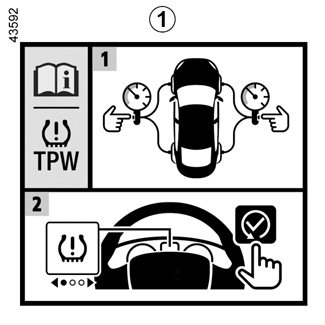
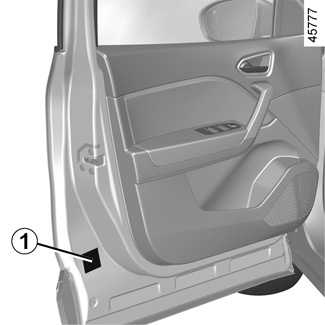
When fitted to the vehicle, this system notifies the driver if one or more tyres lose pressure.
The system can be identified by the 1 label in the vehicle.
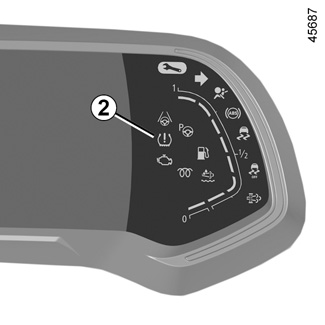
Operating principle
This system detects a loss of pressure in one of the tyres by measuring the wheel speed while driving.
Warning light 2 comes on to alert the driver in the event of insufficient pressure (deflated wheel, punctured tyre, etc.).
Operating conditions
The system should be reset with a pressure equal to that stated on the tyre pressure label (refer to the information on “Tyre Pressures” in section 4), otherwise it may not give a reliable warning in the event of significant pressure loss.
Resetting should always be carried out after checking the tyre pressure of all four tyres when cold.
In the following situations, the system risk coming into action late or not functioning correctly:
- system not reset after reinflation or any operation on the wheels;
- system badly reset: different inflation pressures from the recommended pressures;
- significant change in load or distribution of load on one side of the vehicle;
- sporty driving with strong acceleration;
- driving on snowy or slippery surface;
- driving with snow chains;
- fitting a single new tyre;
- use of tyres not approved by the network.
Resetting the standard level for the tyre pressures
This should be done:
- after each re-inflation or resetting of tyre pressure;
- after changing a wheel;
- after changing wheels around.
Tyre pressures must correspond to the current usage of the vehicle (empty, carrying a load, motorway driving, etc.).
The sudden loss of pressure in a tyre (burst tyre, etc.) cannot be detected by the system.
This function is an additional driving aid.
The function does not take the place of the driver. It cannot, therefore, under any circumstances replace the vigilance or the responsibility of the driver. Check the tyre pressures, including the emergency spare wheel, once a month.
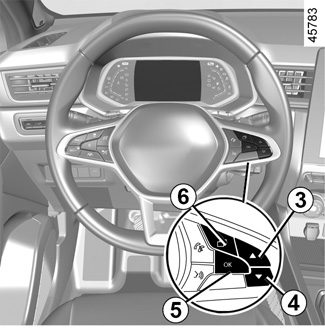
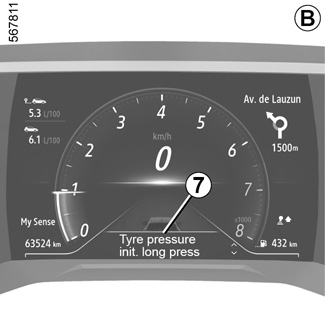
Resetting procedure
Ignition on, vehicle stopped:
- for vehicles fitted with a type A or C instrument panel (TRIP COMPUTER: general information, repeatedly tap the 6 switch as many times as necessary to reach the “vehicle” tab ;
- for vehicles fitted with a type B instrument panel, tap the switch 6 to reach the 7 area of the instrument panel;
- briefly press the 3 or 4 switch to reach the “Tyre pressure init. long press” page;
- press and hold the 5 OK switch to launch the reset.
Hold down the 5 switch until the “Operation completed” message appears. You can now drive.
If the vehicle is equipped with a navigation system, the resetting procedure may also be carried out using the multimedia screen: please see the equipment instructions.
The table below shows the possible messages related to the tyre resetting procedure.
Steps | Messages | Readings |
|---|---|---|
- | Tyre pressure init. at stop | The message is displayed during driving. If you want to reset the pressure of the four tyres, stop the vehicle. |
1 | Tyre pressure init. long press | To reset the pressure of all four tyres, with the vehicle stopped, press and hold the 5 OK switch to launch resetting until the “If pressure OK [hold on]” message is displayed. |
2 | If pressure OK [hold on] | The message flashes to indicate that the system has registered the resetting procedure. If all four tyres have been correctly adjusted to match the tyre pressure values recommended on the tyre pressure label TYRE PRESSURE, press and hold switch 5 OK until the message “Operation completed” appears. |
3 | Operation completed | The resetting procedure has been completed successfully. You can now drive. |
Readjustment of tyre pressures
The pressure of the four tyres must be set when cold (refer to the label located on the edge of the driver’s door).
If tyre pressures cannot be checked when the tyres are cold, the recommended pressures should be increased by 0.2 to 0.3 bar (3 PSI).
Never deflate a hot tyre.
After each reinflation or readjustment of the tyre pressure, launch the reinitialisation of the tyre pressure reference value.
Replacing wheels/tyres
Only use equipment approved by the network, otherwise the system risks late activation or incorrect operation. TYRES.
After each change of wheel/tyre, readjust the tyre pressure and launch the reset of the tyre pressure reference value.
Emergency spare wheel
If fitted on the vehicle, readjust the tyre pressure and launch the reinitialisation of the tyre pressure reference value.
Tyre repair product and inflation kit
Only use equipment approved by the Network, otherwise the system risks late activation or incorrect operation. TYRE PRESSURE KIT. After using the tyre inflation kit, readjust the tyre pressure and launch the resetting of the tyre pressure reference value.
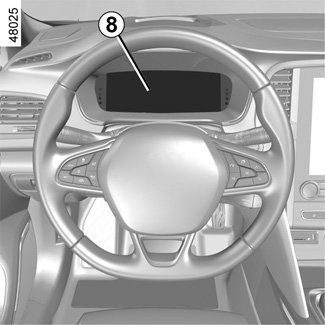
Tyre pressure faults
The table on the following page lists the warning messages which appear on the instrument panel 8 when the system detects a tyre pressure fault.
The information on the instrument panel signals any potential tyre pressure faults (e.g. deflated or punctured tyre).
Indicator lights | Messages | Readings |
|---|---|---|
| Inflate tyres and init. | This indicates that tyre under-inflation or puncture has been detected. Check and adjust the pressure of the four tyres when cold and reset the system. |
| Check tyre press and init. | This indicates that the reset has been unsuccessful. Check and readjust the tyre pressure before re-launching the resetting procedure. |
Check tyre press and init. | This indicates that the last system reset was carried out over 6 months ago or over approximately 6,214 miles (10,000 km). Check and readjust the tyre pressure before re-launching another resetting procedure. | |
+ © | Check TPW | This indicates a fault in the system. Consult an approved dealer. |
| TPW not available | This indicates that an emergency spare wheel different in size to the other four wheels has been fitted to the vehicle. The system remains unavailable until a wheel identical in size to the other wheels has been fitted and the resetting procedure has been carried out. |
